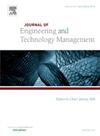Exploring the impact of AI on Web3 decentralized platform business model innovation
IF 3.9
3区 管理学
Q2 BUSINESS
Journal of Engineering and Technology Management
Pub Date : 2025-09-14
DOI:10.1016/j.jengtecman.2025.101911
引用次数: 0
Abstract
Advancements in information technologies have revolutionized business models (BMs), which are now increasingly based on digital platforms. The spread of Web3 has led to further development in this direction, giving rise to platform business models enabled by blockchain technology. At the same time, the advent of artificial intelligence (AI) has further expanded opportunities to innovate BMs. In this study we examine how the integration of AI influences BMs in blockchain-based platforms. We find that the integration of AI plays a key role in the three main dimensions of platform business models: value creation, value delivery, and value capture. We demonstrate, in particular, how AI enhances operational efficiency, strategic governance, and decision-making in Web3 platforms enabled by blockchains. Moreover, AI optimizes personalization, matching processes, and interactions in decentralized platforms. AI also fosters innovation in decentralized platform BMs and requires a skilled workforce. This research underscores how AI can improve performance in blockchain-based platforms, advancing scientific knowledge of decentralized platforms and offering recommendations for managers and policymakers on how to innovate their BMs and leverage AI to maximize value across platforms.
探索AI对Web3去中心化平台商业模式创新的影响
信息技术的进步已经彻底改变了商业模式(BMs),这些模式现在越来越多地基于数字平台。Web3的传播导致了这一方向的进一步发展,产生了基于区块链技术的平台商业模式。与此同时,人工智能(AI)的出现进一步扩大了创新bm的机会。在本研究中,我们研究了人工智能的集成如何影响基于区块链平台的bpm。我们发现,人工智能的集成在平台商业模式的三个主要维度中起着关键作用:价值创造、价值交付和价值获取。我们特别展示了人工智能如何提高区块链支持的Web3平台的运营效率、战略治理和决策。此外,人工智能优化了分散平台上的个性化、匹配过程和交互。人工智能还促进了分散平台bpm的创新,并需要熟练的劳动力。这项研究强调了人工智能如何提高基于区块链的平台的性能,推进去中心化平台的科学知识,并为管理人员和政策制定者提供关于如何创新其bpm和利用人工智能实现跨平台价值最大化的建议。
本文章由计算机程序翻译,如有差异,请以英文原文为准。
求助全文
约1分钟内获得全文
求助全文
来源期刊
CiteScore
8.00
自引率
6.20%
发文量
29
审稿时长
>12 weeks
期刊介绍:
The Journal of Engineering and Technology Management (JET-M) is an international scholarly refereed research journal which aims to promote the theory and practice of technology, innovation, and engineering management.
The journal links engineering, science, and management disciplines. It addresses the issues involved in the planning, development, and implementation of technological capabilities to shape and accomplish the strategic and operational objectives of an organization. It covers not only R&D management, but also the entire spectrum of managerial concerns in technology-based organizations. This includes issues relating to new product development, human resource management, innovation process management, project management, technological fusion, marketing, technological forecasting and strategic planning.
The journal provides an interface between technology and other corporate functions, such as R&D, marketing, manufacturing and administration. Its ultimate goal is to make a profound contribution to theory development, research and practice by serving as a leading forum for the publication of scholarly research on all aspects of technology, innovation, and engineering management.

 求助内容:
求助内容: 应助结果提醒方式:
应助结果提醒方式:


